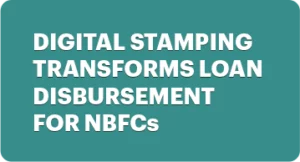Why Digital Stamping Matters: Benefits for Businesses
In the digital age, businesses are constantly seeking innovative solutions to streamline their operations and improve efficiency. One such solution gaining traction is digital stamping, a technology that has the potential to transform how businesses handle important documents and transactions. In this comprehensive guide, we will explore what digital stamping is, why it’s important for businesses, the industries that require it, its benefits, and how it can help companies save both time and money while enhancing overall efficiency and productivity.
Understanding Digital Stamping
Digital stamping, also known as e-stamping or electronic stamping, is a technology-driven method of authenticating documents and transactions. Unlike traditional physical stamps, digital stamping involves the application of a virtual or electronic stamp to documents. This stamp serves as proof of payment of stamp duty, which is a tax levied on various legal and financial documents, such as contracts, agreements, deeds, and more.
Why Digital Stamping is Important for Businesses
Digital stamping holds significant importance for businesses for several compelling reasons:
1. Efficiency and Speed
Traditional stamp duty payment processes often involve physical visits to government offices or authorized centers, resulting in delays and inefficiencies. Digital stamping, on the other hand, offers a swift and convenient alternative. It allows businesses to electronically stamp documents within minutes, eliminating the need for time-consuming visits and paperwork.
2. Enhanced Security
One of the most critical aspects of digital stamping is the heightened security it provides. Digital stamps are tamper-proof, making it extremely challenging for malicious actors to alter or forge documents. This level of security instills trust in business transactions, safeguarding sensitive information and contracts.
3. Transparency and Accountability
Digital stamping solutions offer transparency in the stamping process. Every step, from stamp creation to verification, is recorded digitally, ensuring that all transactions are accountable. This transparency minimizes disputes and helps businesses maintain a clear audit trail for compliance purposes.
Industries that Require Digital Stamping
Numerous industries can benefit from the adoption of digital stamping. Here are some key sectors where digital stamping is particularly crucial:
1. Real Estate
The real estate industry heavily relies on contracts, agreements, and property transactions. Digital stamping simplifies the documentation process, reduces the risk of disputes, and expedites property transfers.
2. Banking and Financial Services
In the financial sector, where compliance is paramount, digital stamping ensures the authenticity of financial documents, contracts, and agreements. It enhances security and expedites loan processing, making it a valuable tool for financial institutions.
3. Insurance
Insurance companies deal with a plethora of policies and claims. Digital stamping enhances policy issuance, claims processing, and regulatory compliance, ultimately improving customer service and reducing fraud.
4. Legal
Law firms and legal departments handle a multitude of documents daily. Digital stamping streamlines document authentication, making it easier to manage contracts, court filings, and legal agreements.
5. Healthcare
In the healthcare industry, patient records, prescriptions, and medical reports need to be securely stamped for authenticity. Digital stamping ensures the integrity of these critical documents, aiding in patient care and compliance.
6. Manufacturing
Manufacturing companies rely on a vast array of contracts and supplier agreements. Digital stamping simplifies the document management process, reducing administrative overhead and ensuring the accuracy of these agreements.
7. Retail
Retailers often enter into supplier contracts and agreements. Digital stamping simplifies the procurement process, enhances supplier accountability, and accelerates inventory management.
8. E-commerce
E-commerce platforms generate numerous digital contracts, invoices, and shipping documents. Digital stamping boosts trust and transparency in online transactions, contributing to customer satisfaction and loyalty.
Benefits of Digital Stamping for Businesses
The adoption of digital stamping can yield a wide range of benefits for businesses:
1. Time and Cost Savings
Digital stamping eliminates the need for physical visits to stamping authorities, reducing the time and resources spent on the stamping process. This efficiency translates into significant cost savings for businesses.
2. Enhanced Security and Fraud Prevention
Digital stamps are nearly impossible to tamper with or forge, ensuring the authenticity of documents and transactions. This level of security minimizes the risk of fraud and disputes.
3. Improved Compliance
Digital stamping solutions often come with built-in compliance features, helping businesses adhere to legal requirements and regulatory standards seamlessly.
4. Streamlined Document Management
Digital stamping simplifies document management, allowing businesses to organize, store, and retrieve stamped documents with ease. This streamlining of processes reduces administrative burdens.
5. Accelerated Transactions
With digital stamping, businesses can complete transactions faster, reducing delays and improving customer satisfaction. This is especially crucial in industries where time-sensitive agreements are common.
6. Eco-Friendly
Digital stamping reduces the need for physical stamps and paper documents, contributing to environmental sustainability by minimizing paper waste.
How Digital Stamping Improves Business Efficiency and Productivity
Efficiency and productivity are paramount for businesses striving to stay competitive. Digital stamping plays a crucial role in achieving these goals:
1. Faster Decision-Making
Digital stamping accelerates the approval and verification processes, enabling businesses to make quicker decisions. This agility is particularly valuable in negotiations and contractual agreements.
2. Reduced Administrative Overheads
The automation and digitalization of the stamping process minimize administrative tasks associated with paperwork and physical visits. This frees up valuable time and resources for more strategic business More details.
3. Enhanced Collaboration
Digital stamping solutions often come with collaboration features, allowing multiple parties to access and review documents simultaneously. This fosters collaboration and expedites decision-making.
4. Better Data Management
Digital stamping solutions typically include data storage and retrieval capabilities. This makes it easier for businesses to access historical documents, track changes, and analyze data for better decision-making.
5. Improved Customer Service
Faster transaction processing and reduced errors result in improved customer service. Clients and partners appreciate the efficiency and reliability of businesses that embrace digital stamping.
Challenges of Traditional Stamp Duty Payment
Digital stamping addresses these challenges effectively:
1. Fast, Easy, and Convenient
Digital stamping offers a swift and hassle-free alternative to the traditional process. With digital stamping solutions like MSB Docs, businesses can electronically stamp documents within minutes, eliminating the need for physical visits and long waiting times. This efficiency accelerates the pace of transactions, benefiting businesses across the board.
2. Secure and Tamper-Proof
One of the most significant advantages of digital stamping is the enhanced security it provides. Digital stamps are tamper-proof, making it nearly impossible for malicious actors to alter or forge documents. This level of security instills trust in business transactions, safeguarding sensitive information and contracts.
3. Transparent and Accountable
Digital stamping solutions offer transparency in the stamping process. Every step, from stamp creation to verification, is recorded digitally, ensuring that all transactions are accountable. This transparency minimizes disputes and helps businesses maintain a clear audit trail for compliance purposes.
How to Get Started with Digital Stamping with MSB Docs
Getting started with digital stamping is easier than you might think. MSB Docs offers a user-friendly platform that allows businesses to:
1. Create Digital Stamps
Design custom digital stamps to suit your business needs, including logos, watermarks, and authentication elements.
2. Stamp Documents
Electronically stamp documents with just a few clicks, ensuring their authenticity and tamper-proof status.
3. Track and Verify
Easily track and verify stamped documents, maintaining transparency and accountability throughout the process.
4. Secure Storage
Store your digitally stamped documents in a secure cloud-based repository, accessible whenever needed.
5. Integration
MSB Docs seamlessly integrates with various business applications, making it a versatile solution for your organization.
Stamp Documents Digitally With MSB Docs
In a world where speed, security, and efficiency are paramount, digital stamping emerges as a vital tool for businesses across industries. It not only addresses the challenges of traditional stamp duty payment but also offers a multitude of benefits, ranging from time and cost savings to improved security and transparency.To ensure the validity of E-Stamp certificates, you’ll need to know the process.Get the details in our comprehensive guide.
Now that you know why digital stamping matters for businesses, let’s delve deeper into its transformative potential.Request a demo or book your free trial with MSB Docs today.
FAQs
1. Are digitally stamped documents legally recognized worldwide?
The legal recognition of digitally stamped documents can vary by country and jurisdiction. While many countries have adopted electronic authentication methods, it’s essential to check the specific regulations in your region to ensure compliance.
2. Can digital stamping be used for both personal and business documents?
Digital stamping is primarily used for business and legal documents due to its role in ensuring document authenticity and compliance with stamp duty requirements. However, some individuals and organizations may also use it for personal documents, such as contracts and agreements.
3. Are there specific industries that are mandated to use digital stamping?
While certain industries, like real estate and finance, benefit greatly from digital stamping, it may not be mandated for all. Regulations regarding digital stamping requirements can vary, and it’s essential to check with relevant authorities or legal experts to determine specific industry mandates.
4. How long does it take to implement a digital stamping solution for a business?
The implementation timeline for a digital stamping solution can vary depending on the complexity of your organization’s processes and the chosen solution provider. Some businesses can set up digital stamping in a matter of days, while others may take longer to ensure seamless integration with existing systems.
5. Are there any ongoing costs associated with digital stamping solutions?
Yes, there can be ongoing costs associated with digital stamping solutions. These costs may include subscription fees, maintenance fees, and fees related to the number of stamps or documents processed. It’s crucial to understand the pricing structure of your chosen solution to budget accordingly.





